Edge AI Alpha Release
Introduction
As generative misinformation escalates and synthetic media proliferates, reliable data resolution has never been more crucial. Today, we’re excited to announce the alpha release of Edge AI Oracle, a truth-seeking Oracle designed for the decentralized future. Built using the latest advancements in LLMs, Edge AI Oracle orchestrates a multi-agent council, built on Langchain and Langgraph, that maximizes objectivity, transparency, and efficiency in query resolution.
Through a decentralized AI Oracle Council powered by independent LLMs, Edge AI Oracle agents ensure that responses to user queries are free from individual model biases, sourcing and verifying data with rigorous accuracy. This alpha release represents a significant milestone in blockchain and prediction markets, enabling high-stakes queries to be resolved objectively and reliably.
How Edge AI Oracle Works
Edge AI Oracles unlock a wide range of applications across decentralized ecosystems, many of which we’ll explore in future posts. Today, we’re focusing on the prediction market use case, a core application of the Edge.
In this alpha release, Edge AI Oracle is presented from the perspective of a node operator, showcasing how nodes interact with and support Oracle functionality. Future deep dives will explore additional stakeholders and other powerful use cases.
Edge AI enables precise, traceable, and reliable resolutions on virtually any topic, from “Who won the election?” to “How many goals did Messi score?” and “Who are the latest Nobel Prize winners?” Unlike traditional oracles, Edge AI Oracle processes each query through an AI Oracle Council—a decentralized network of agents powered by diverse models from providers like OpenAI, Anthropic, and Meta. This architecture ensures each resolution is objective, accurate, and fully explainable, making it ideal for high-stakes prediction markets.
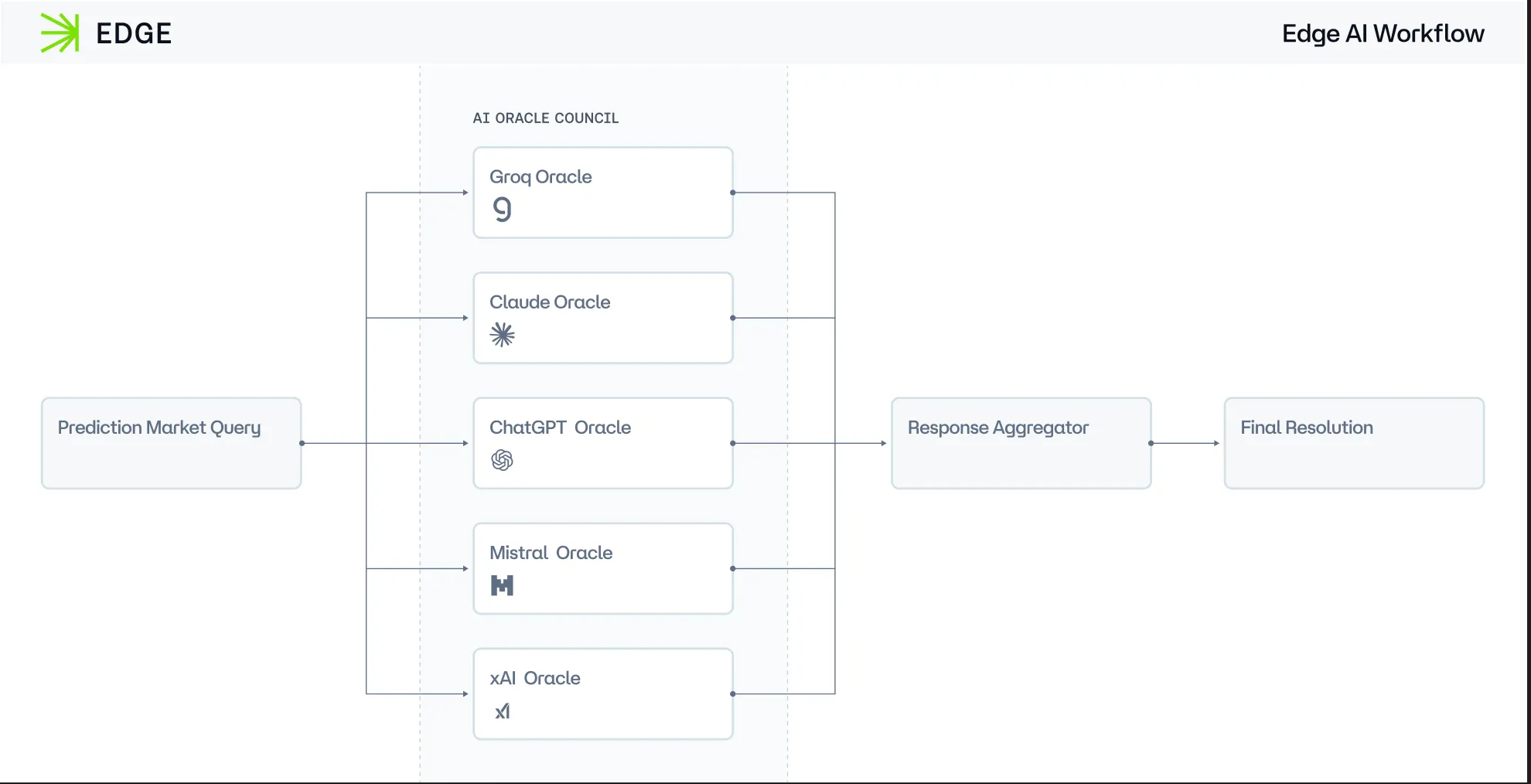
This decentralized model allows Edge AI to sidestep the limitations and bias of single-model solutions, providing a multi-perspective, bias-filtered approach to query resolution.
For the Wintermute Election market, we’ve set the Council to require unanimous agreement with over 95% confidence from each Oracle AI Agent.
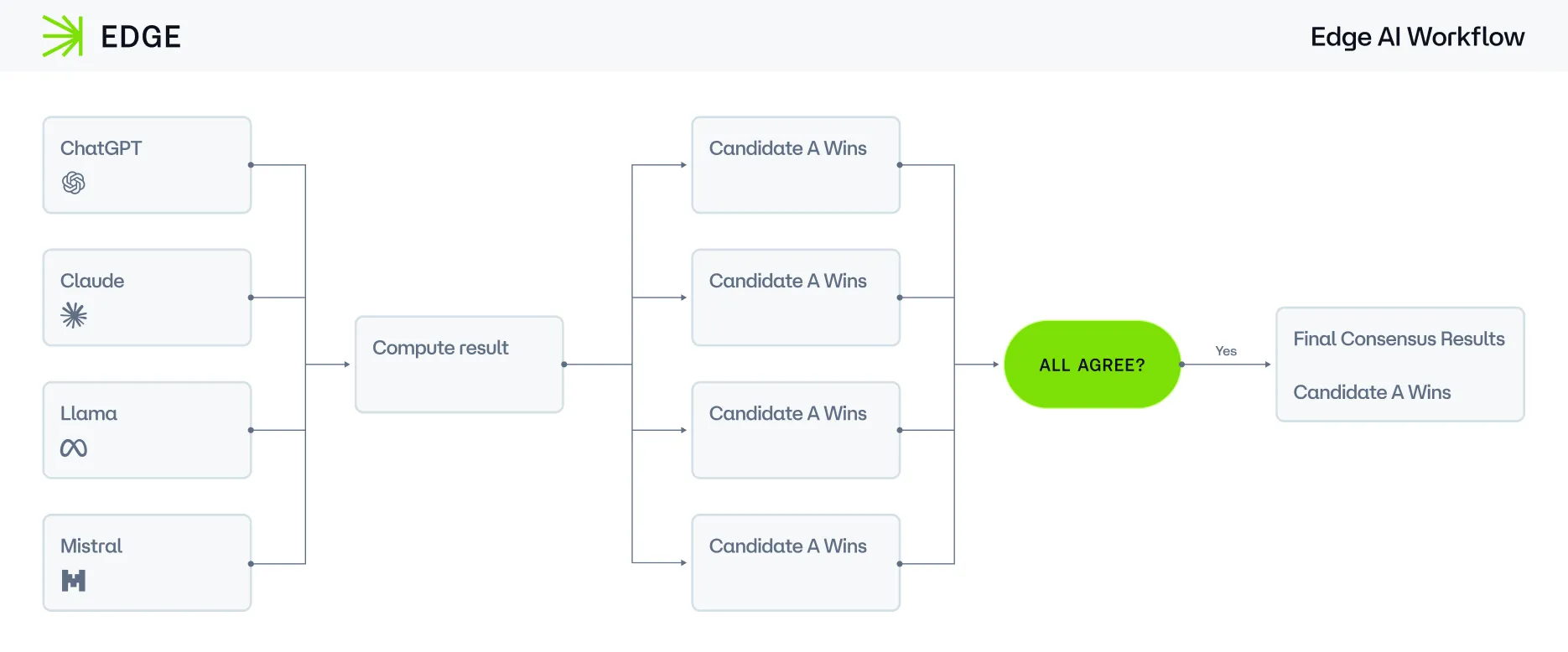
Consensus requirements are fully configurable on a per-market basis, and with the upcoming Beta release, developers and market creators will have autonomous control over these settings.
Use Case: Prediction Markets
Edge AI Oracle’s capabilities are ideal for prediction markets, enabling users to create reliable, transparent betting scenarios on a wide array of events. As synthetic media grows, these markets increasingly rely on an impartial Oracle to ensure data accuracy and outcome integrity. Here’s how Edge AI Oracle enhances prediction markets:
- Political Events: Edge AI Oracle was adopted by Wintermute for its 2024 U.S. Election outcome market, cross-referencing non-partisan sources to provide an unbiased, credible result.
- Sports and Esports Outcomes: For major competitions like global esports tournaments or the Super Bowl, Edge AI Oracle rigorously verifies event outcomes to prevent misinformation and manipulation.
- Scientific Breakthroughs: Edge AI Oracle is ideal for markets speculating on advancements, such as predicting when OpenAI will officially release its next frontier model. By validating information from reputable sources, the Oracle ensures outcomes are based on verified developments rather than speculative reports.
- Financial Market Events: Edge AI Oracle supports predictions on key financial events, such as quarterly earnings or major market shifts, using accurate, real-time financial data.
- Cultural Events: From film award winners to box office records, Edge AI Oracle offers verified resolutions for markets around high-profile cultural events.
- Weather and Climate Outcomes: Edge AI Oracle enables predictions on weather and climate milestones, validating data from reliable meteorological sources for high-accuracy outcomes.
Edge AI Oracle’s transparent, data-driven resolutions make it a powerful tool for prediction markets, ensuring each outcome is backed by rigorous, unbiased data.
Edge AI Oracle Workflow
- Node Operators propose and reach consensus around an AI council. An AI council uses distinct AI Oracle Agents to determine market outcomes together, while bypassing single-model dependency and bias. Edge AI Oracle Agents utilize top models like OpenAI, Anthropic, Meta, and Mistral for inference.
- Consensus - An AI council achieves 95% confidence to finalize elections. If confidence score requirements are not met, Edge continuously reruns stage 1.
- Publish Market Resolution to the Edge ElectionOracle Contracts. Results are published on the Edge ElectionOracle contract on Ethereum.
- Multi-Chain Markets, powered by LayerZero. LayerZero is used to read values from Ethereum and publish to Edge ElectionOracle contracts on Base & Arbitrum.
- Market Resolution. Wintermute’s OutcomeMarket reads the results from the ElectionOracle contract, resolving markets based on the confirmed winners across all chains.

Architecture: Decentralized AI Oracle Council and Multi-Agent Orchestration
The architecture of Edge AI Oracle is built to tackle three fundamental challenges of truth-seeking oracles:
- Prompt Optimization
- Single Model Bias
- Retrieval Augmented Generation (RAG).
Hosted on the Edge Oracle Network and powered by LangChain and LangGraph, the system leverages advanced multi-agent orchestration to enhance query accuracy and reliability.
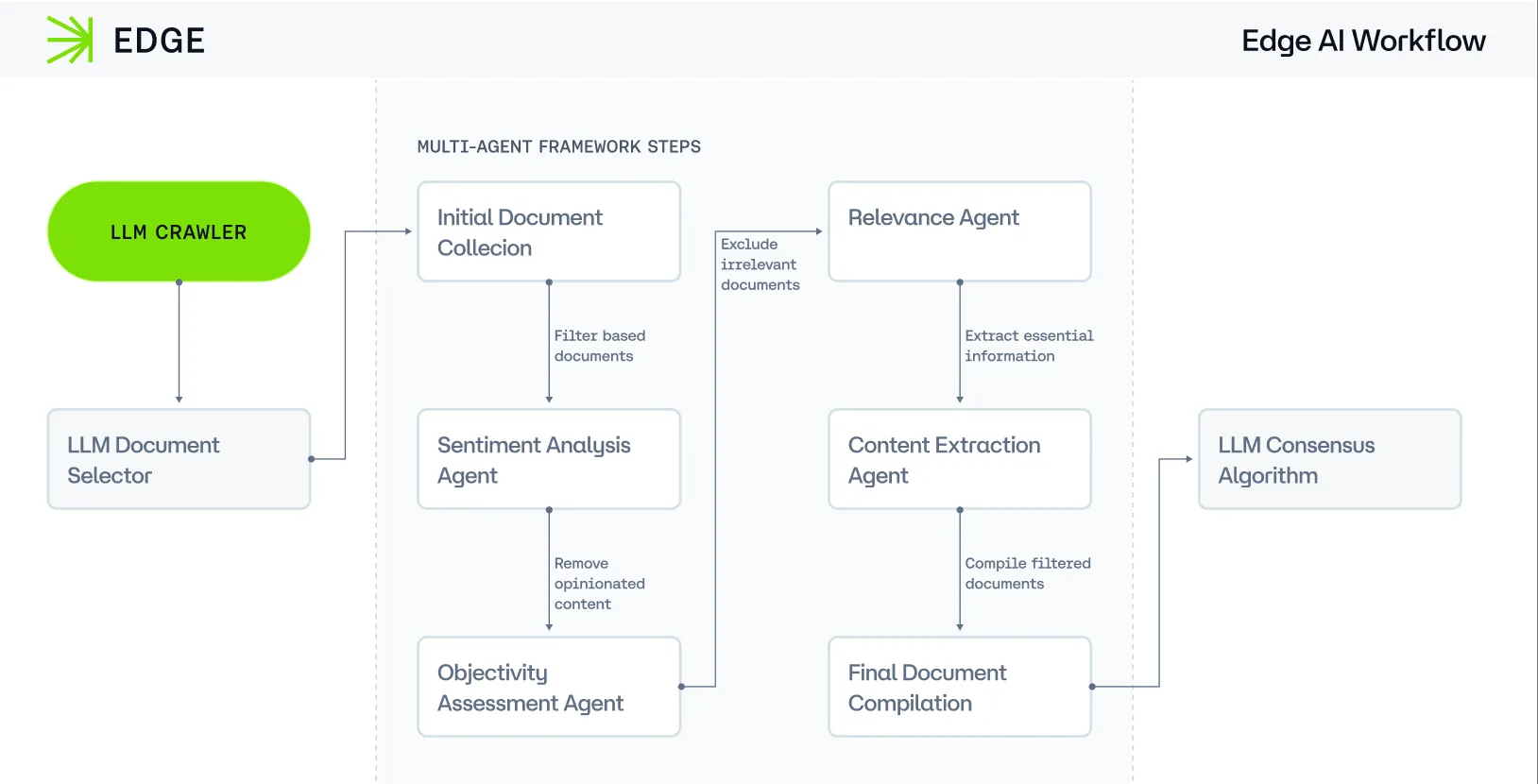
Research Agent: The workflow begins with the research_analyst, which reviews the query, identifying key data points and required sources. The researcher agent is based off the excellent GPTResearcher implementation.
Web Scraper Agent: The query is then passed to the web_scraper, which retrieves data from external sources and databases and prioritizes reputable, verified information.
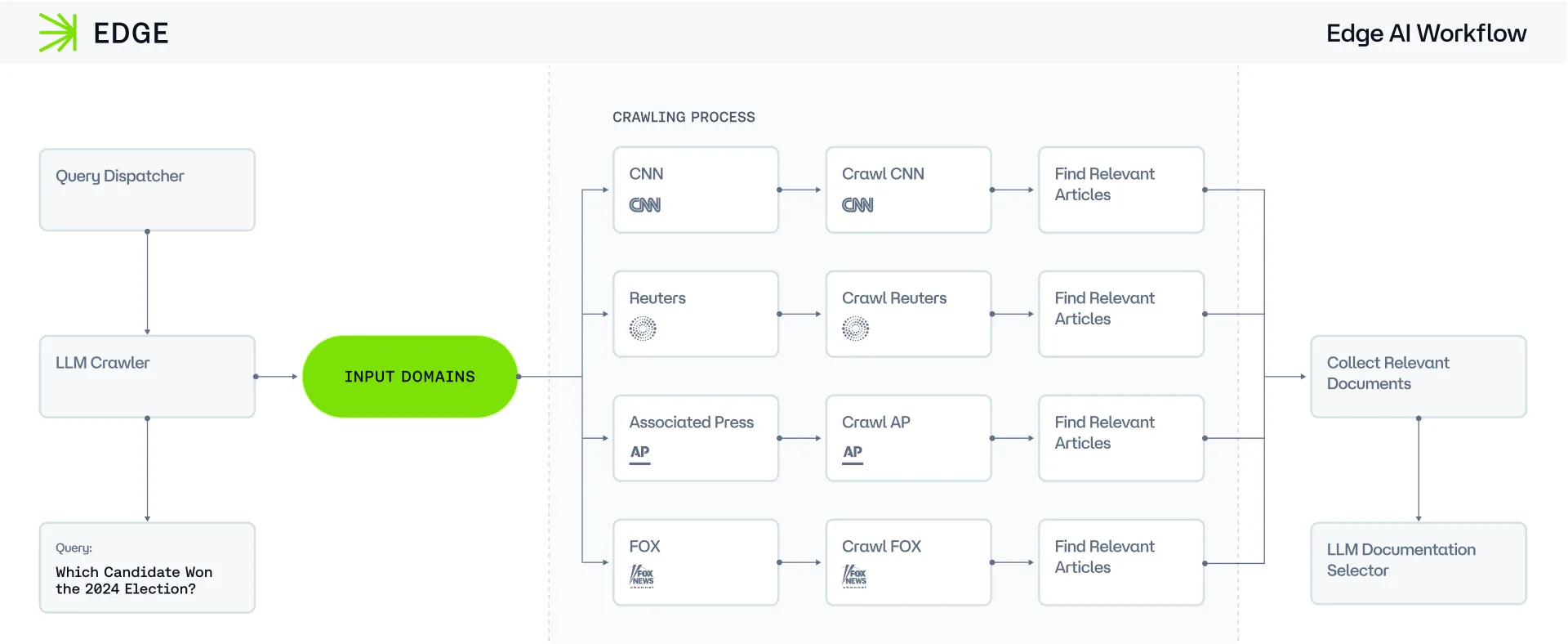
Document Relevance Analyst: The document_bias_analyst reviews the gathered data, applying filters and checking for bias, ensuring the data pool remains neutral and credible.
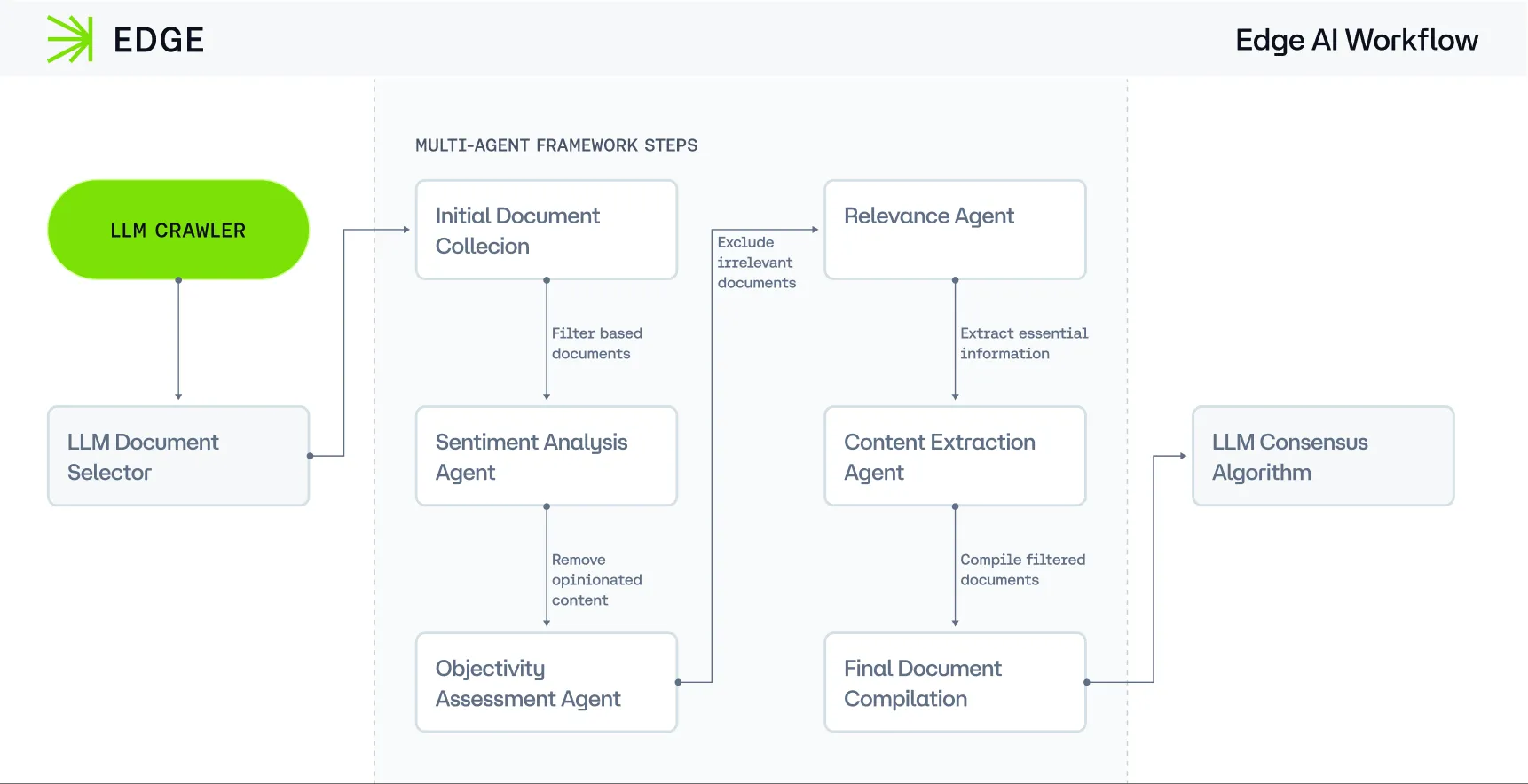
Report Writer Agent: The report_writer synthesizes findings into a cohesive report, presenting an initial answer based on the research and analysis conducted.
Summarizer Agent: The summarizer condenses the report, distilling the key insights and findings into a concise form suitable for final processing.
Classifier Agent: Finally, the classifier evaluates the summarized output, categorizing and validating it against preset criteria before reaching the END of the workflow.
Each stage is executed sequentially, ensuring that data flows systematically from one agent to the next, enhancing transparency and accuracy in query resolution.
LangChain and LangGraph: Multi-Agent Orchestration Framework
LangChain and LangGraph form the core of Edge AI Oracle’s multi-agent system, making it possible to orchestrate complex, stateful interactions and optimize query resolution. With LangChain’s adaptable components—from prompt templates to retrieval tools and output parsers—each Oracle agent can handle tasks independently while seamlessly integrating with other agents in the workflow. LangGraph then builds on this structure by enabling directed, cyclical workflows across agents, ensuring a well-coordinated, step-by-step process that is critical to achieving high accuracy and transparency in data resolution.
- LangChain Components: LangChain supplies the essential building blocks to retrieve, organize, and structure data within each agent, allowing us to maintain high-quality, bias-filtered responses. Importantly, LangChain serves as a flexible gateway to multiple frontier models, providing a unified API and interface that simplifies extending support to various LLMs. This capability empowers Edge AI Oracle to leverage a diverse set of LLMs, ensuring balanced perspectives within the Oracle Council while minimizing individual model biases.
- LangGraph Workflow: LangGraph’s graph-based structure and stateful interactions enable the precise multi-agent orchestration that powers the Decentralized AI Oracle Council. A directed, cyclical workflow allows each agent to build on the work of others, coordinating Oracle agents from initial research to final consensus in a structured flow:
- Workflow Breakdown:
- The workflow begins with the research_analyst node, where initial data gathering and query parsing occur.
- The agent moves to the web_scraper, gathering relevant, reputable data from external sources.
- A document_bias_analyst then filters out any potential biases within the retrieved data.
- This leads to the report_writer, who synthesizes findings into a coherent report.
- Finally, a summarizer distills the report into concise conclusions, which the classifier evaluates before reaching the workflow’s END.
- Workflow Breakdown:
Through LangGraph’s edge-based orchestration, each task is smoothly handed off to the next, ensuring a cohesive and logical resolution process.
Building the Future of Truth-Seeking AI Oracles
The alpha release of Edge AI Oracle marks a significant step forward in building a reliable, objective Oracle system. Leveraging the latest innovations in LangChain and LangGraph, Edge AI Oracle is designed to transform blockchain security, prediction markets, and decentralized applications by providing a scalable, multi-agent, truth-seeking Oracle. In future posts, we’ll dive deeper into the infrastructure stack, query routing, prompt caching, and optimization strategies that make Edge AI Oracle an essential tool for the decentralized era.
What's Next
As we move beyond alpha, the Edge Oracle Network will expand in powerful ways. To date, we’ve focused on building a resilient Oracle network that spans price feeds, risk assessments, proofs, and arbitrary data requests, serving a broad spectrum of prediction markets. But this is just the beginning. Upcoming releases will emphasize network decentralization, developer APIs, and permissionless access, along with innovative, high-integrity data products that pave the way for next-generation on-chain applications.
At Chaos Labs, we’re thrilled to bring this tool to the world, bridging AI-driven insights with objective truth. Stay updated on our progress via our blog and Twitter, or join us at the inaugural Chaos Labs Summit in Bangkok!
dydx Re-launch Rewards Explainers
Market makers and traders can earn dydx rewards based on their activity and contributions, with traders earning points through taker fees and market makers earning points by fulfilling orders and providing liquidity. Points are weighted differently across markets, and rewards are distributed proportionally based on a 7-day TWAP of the dydx price.
Trusting Trust in the Age of AI
While resources are heavily invested in improving frontier models and optimizing prompts, the true challenge lies in how AI systems retrieve and rank information. Chaos Labs identifies the greatest risk in AI-generated misinformation infiltrating the data pipeline. If AI agents are unknowingly trained on manipulated or sybilled content, it becomes nearly impossible to trust their outputs. This vulnerability is exacerbated by unreliable document ranking systems, which prioritize popularity and commercial interests over accuracy. The Dead Internet Theory, which warns of a future where human-created content is drowned out by machine-generated noise, serves as a chilling reminder of what’s at stake if these systems are not carefully safeguarded.
Risk Less.
Know More.
Get priority access to the most powerful financial intelligence tool on the market.